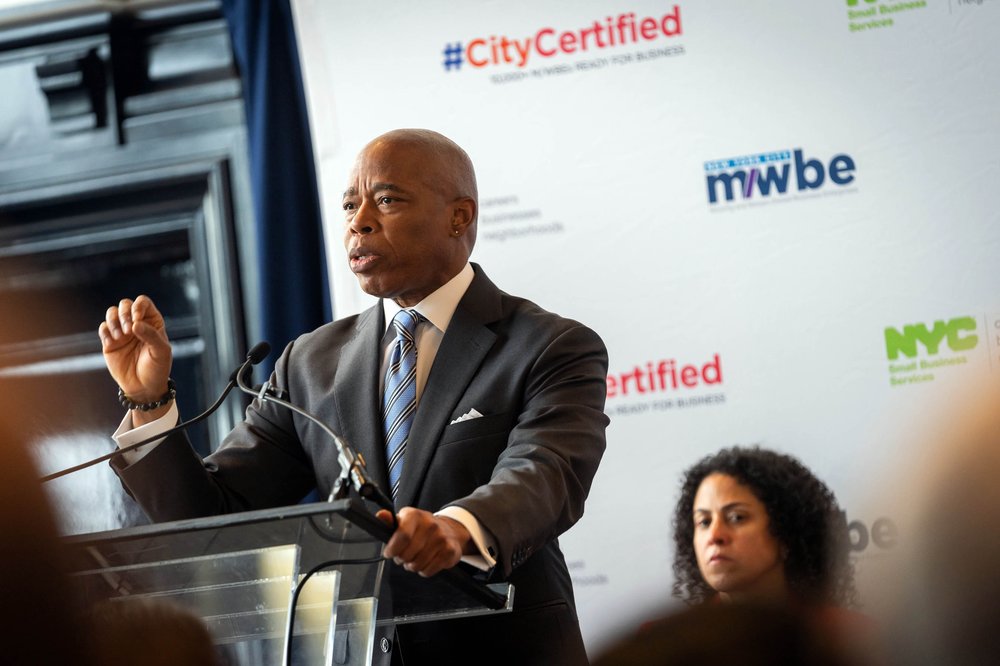Trump presidency offers Mayor Adams a path to pardon, but it comes with political risk
Nov. 6, 2024, 1:46 p.m.
Trump could hurt the mayor’s most vulnerable constituents, but he could also end some of his legal woes.

As Democrats come to grips with Donald Trump’s return to the White House, Mayor Eric Adams faces a legal and political bind: He could benefit from the incoming president’s sympathy as he fights federal corruption charges, but risks suffering politically by cozying up to his party’s most powerful adversary.
Adams’ delicate dance with Trump was on display at a press conference at City Hall on Wednesday, where the mayor pledged to work with the new administration while protecting the interests of New Yorkers, including women, immigrants and LGBTQ+ people.
“We will work with the new administration and Congress to develop a realistic and compassionate national strategy for our immigration system,” Adams said.
As the tense press conference wrapped up, Adams ignored questions about whether Trump’s election could benefit his battle against federal corruption charges.
In the leadup to the election, Trump expressed sympathy for Adams’ legal troubles, saying the mayor is facing retaliation from the Justice Department for criticizing President Joe Biden’s handling of the migrant crisis. Adams, in turn, refused to condemn Trump in the days leading up to the election and dodged questions on whether his reticence was hurting Vice President Kamala Harris.
The tension will only escalate as Trump takes office after a dark campaign that centered on deportation of undocumented immigrants. Adams rebuffed questions about how the city will respond if Trump follows through on his pledge. As a sanctuary city, New York City limits its cooperation with federal immigration authorities. The mayor has said he supports the city’s sanctuary policies, but he has questioned rules that restrict when city officials may assist federal immigration agents.
“Do you protect New York as a sanctuary city or do you consider your own liberty in that equation?” said Basil Smikle, a former Democratic strategist who now teaches at Columbia University. “What’s going to win out?”
Although Trump has been partial to Adams' woes, he has not committed to pardoning the mayor if he is convicted or interfering with his case as it moves toward a trial. New administrations typically appoint new U.S. attorneys with their own set of priorities. Manhattan U.S. Attorney Damian Williams, a Biden appointee, is heading the case against the mayor.
Without evidence, Trump has portrayed himself and Adams as victims of retaliation by Biden’s Department of Justice.
“I know what it’s like to be persecuted by the DOJ for speaking out against open borders,” Trump said last month. “We were persecuted, Eric. I was persecuted, and so are you, Eric.”
Adams has pleaded not guilty to charges he traded political favors for illegal campaign donations and more than $100,000 in travel perks. Federal prosecutors have said they expect to bring additional charges against the mayor. His trial is scheduled for April.
During his first term, Trump commuted the sentences of former Illinois Gov. Rod Blagojevich and former Detroit Mayor Kwame Kilpatrick, who were both Democrats. Trump said Blagojevich was the victim of prosecutorial overreach. His reasons for commuting Kilpatrick’s sentence were less clear, though the former mayor of the largest city in Michigan, a key swing state, had flattered Trump in a letter.
Adams’ conflicting political and legal considerations portend a very different response to Trump than City Hall took in 2016. Bill de Blasio, the mayor at the time, promised to shield New Yorkers from Trump’s policies, including a more aggressive approach to deportation. In the ensuing years, de Blasio and the City Council passed measures that expanded protections for undocumented New Yorkers and asylum-seekers.
In a telephone interview, de Blasio said local governments have significant power to thwart federal policies. He said Adams needed to reassure New Yorkers that the city would “persevere.”
“When any president does anything against the interests of New York City, the mayor has to stand up to it,” he said.
About half a million undocumented people live in New York City, according to a 2018 city report. More than 210,000 migrants have arrived in the city since the start of the migrant crisis in 2022.
Smikle said Adams should expect to face more scrutiny in the coming months.
“The eyes of voters will turn back to New York leadership,” said Smikle. “There may be an interest in having more progressive leadership or at least a leadership that isn’t bogged down by these investigations.”
Here are how Donald Trump's promised policy changes could be felt in NYC New Yorkers pass measure granting Mayor Adams more control over cleaning public spaces, other ballot measures Democrats’ gains in NY are cold comfort as Republicans dominate nationally